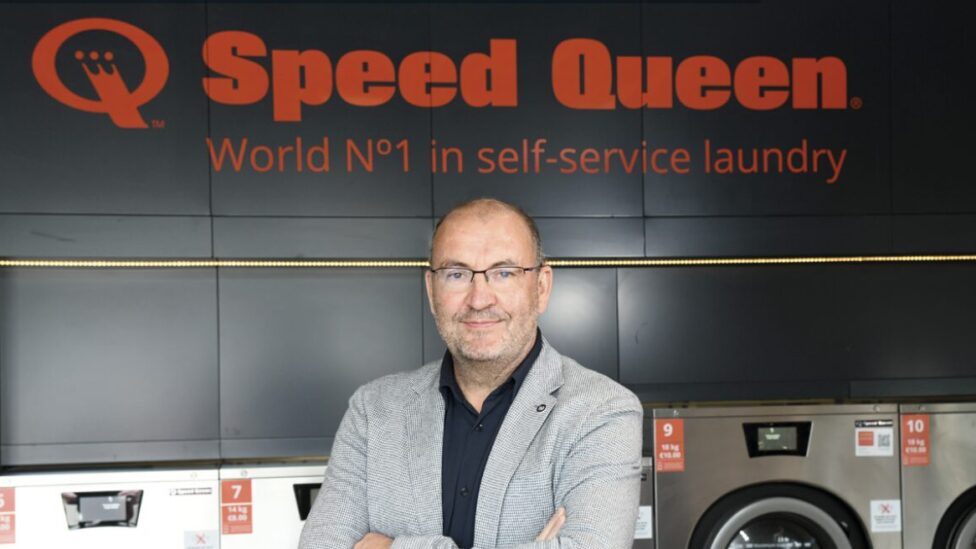New automated-laundry format Speed Queen has landed in the UK, and its owners are looking for retailers to take on the concept in their areas.
Speaking exclusively to Better Retailing, the licence holder for the brand in the UK and Ireland, Patrick Brennan of DNL Collective, explained how the units are proven to deliver around £250,000 of profit in their first three years; why they are a perfect match for convenience stores and forecourts, and how demand for laundry services is higher than most people realise.
In partnership with Tesco in Ireland, Brennan has already launched and tested 22 sites on the supermarket’s forecourts. “We’re not just here to sell stores, we’re going to invest and open them as well,” he explained.
The concept’s first UK backers are the “exceptional” Scottish forecourt owners RaceTrack, with a Speed Queen concession at its new Wishaw site near Glasgow already trading.
A Speed Queen is automated, running on card payments with live sales and CCTV tracking to make operating costs near non-existent.
The opportunity
“It’s a turnkey solution – they hand us the keys and when they come back, their store is ready to trade,” Brennan stated. Each site requires an investment of around £250,000 from the retailer, with the founder adding: “Our data proves a three-year return on investment, which is pretty much unseen across most sectors.”
Nearly £200,000 of the £250,000 is spent on equipment. Brennan said: “Financing has not been an issue because it’s going into assets with serial numbers. We have real live data and financial models that have been given to banks and they’ve been happy to accept.”
Four investments making convenience stores more profitable
In return for the investment, Brennan’s average site in Ireland is delivering 60 customers on peak days, and 30 customers on quieter days such as Tuesdays and Wednesdays.
The average spend per customer is £15. The sites operate without staff except for cleaning. “To own and operate a Speed Queen in an adjacent premises takes one hour to 90 minutes of staff time per day from an existing employee, so zero labour cost pretty much,” he said.
The opportunity to leverage existing staff to operate the site is what makes existing store owners a core part of Speed Queen’s UK expansion plans. The four models suggested for retailers are: converting an existing store; adding a Speed Queen to a store; adding one to an adjacent unit; or using its prefabricated units to place one on a car park or forecourt.
Other benefits include the opportunity to cross-sell to customers. Brennan said the average laundry-service user has a one-hour dwell time, with 60% of users in his Ireland Tesco sites also visiting the supermarket while they wait. Of these “over 50%” took a trolley for a larger shop.
Challenged on the reputation of launderettes for being a declining market, Brennan admitted the number of sites had fallen from 12,000 in the 1970s to “fewer than 3,000”, but said the decline was driven by poor locations, labour-intensive models and service standards, not a lack of demand.
He explained: “I’ve got stores where people have said, ‘It won’t work there, everyone is driving a BMW’. We do it, and it works. Everybody uses a launderette, from 16-to-96-year-olds, male and female, bank managers, tradespeople, every demographic. Our advertising educates people on why to use a launderette, even if you have a washer dryer at home. There’s things you can’t do in that machine or are much easier with us. Think of a family returning from holiday. That’s three days of laundry at home or an hour with us. Bedding is difficult to do at home. For elderly people, it’s simpler to do at a launderette without worrying about drying clothes at home in bad weather.”
The right sites and retailers
The major factor in the success of the site is the number of homes nearby. Brennan commented: “You’re looking ideally for 5,000 chimney pots. In rural areas, that radius can be six to seven miles – they’re used to commuting into the town.
“In more built-up areas, we believe we can put a store for every 5,000- 10,000 chimney pots at a two-mile radius.”
The format “ideally” requires 750sq ft, but sizes either in development or up and running range from 500sq ft to 2,000sq ft. Brennan said he is looking for partners to open multiple sites to limit the number of operators and ensure each gets a high level of support.
He added he would also consider giving operators territorial exclusivity.
Read more about convenience retail services



Comments
This article doesn't have any comments yet, be the first!